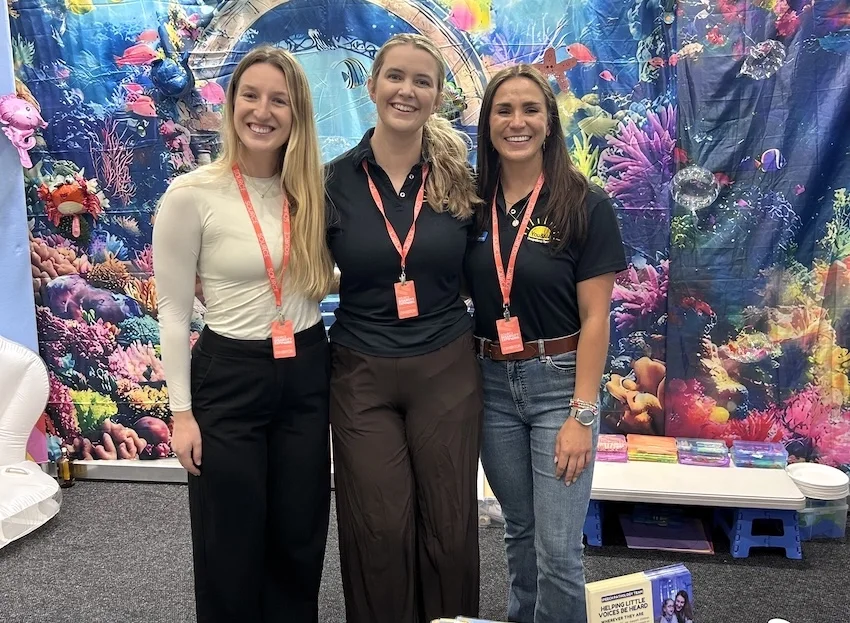Mobile Speech Therapy & Speech Pathology
Work with our engaging, empathetic and informed community and home speech pathology team.
Personalised speech therapy to help you communicate with confidence.
Whether it’s trouble pronouncing words, expressing thoughts, or joining in conversations, our experienced speech therapists are here to help.
We take the time to understand each child’s unique communication goals and challenges, creating fun and engaging therapy sessions that build real progress and confidence.
Through evidence-based techniques, games, and interactive activities, we help children improve clarity, strengthen language skills, support social communication, and develop communication skills for everyday life.
It’s not just about speaking clearly. It’s about feeling confident, supported, and understood, especially when facing a communication difficulty.
Ready to help your child communicate with ease? Get in touch today!
Speech Therapy Can Help:
-
Support early intervention for speech delay
Understand and use language more effectively
Build confidence in communication and conversation
Improve sentence structure, vocabulary, and grammar
Support learning and academic development
Encourage clear, confident self-expression
-
Improve pronunciation and speech clarity
Correct sound errors and articulation patterns
Build confidence in daily conversations
Support long-term communication development
-
Reduce stuttering and improve speech flow
Learn techniques to manage tension and breathing
Increase comfort and confidence while speaking
Reduce anxiety around communication
-
Support healthy voice use and vocal habits
Reduce hoarseness, strain, and vocal fatigue
Improve tone, pitch, and projection
Restore confidence in your speaking voice
-
Improve understanding and following directions
Expand vocabulary and comprehension
Develop storytelling and expression skills
Support learning and classroom participation
-
Improve pronunciation and speech clarity
Develop natural rhythm and tone
Build confidence speaking in any environment
-
Improve chewing and swallowing coordination
Support safe and comfortable eating
Build positive mealtime habits
Reduce stress around feeding for both child and family
Why choose us for speech therapy?
-

We come to you.
Therapy takes place in the setting that works best for you, whether at home, school, or in the community. Our mobile team makes therapy more accessible, flexible, and comfortable for every family.
-

The latest science.
We use neuro-affirming, evidence based approaches, not outdated behaviour management techniques. Our goal is to support strengths, build confidence, and help each person thrive in their own way.
-

Everything in one place.
Our multidisciplinary team includes occupational therapists, speech pathologists, exercise physiologists, dietitians, and social workers, working collaboratively together to provide complete, holistic care.

Ready to get started?
Speech skills we help you develop.
About our team.
We are an enthusiastic team of Occupational Therapists and Speech Pathologists providing support across Perth, Brisbane, Ipswich, the Sunshine Coast, and the Gold Coast, including guidance from an experienced speech pathologist.
We are passionate about providing gold standard, evidence-based therapy to all of our clients and their families through personalised speech pathology services.
Our OT team has core skills and diverse strengths, including extensive experience in varied communication needs, ensuring we can always support you to achieve your goals.
Can’t make a face-to-face appointment? No worries! We’ve got you covered with telehealth therapy and flexible therapy sessions.
Speech Pathology FAQ
-
A speech pathologist, also called a speech therapist, assesses and treats communication, speech, and swallowing difficulties.
They support people of all ages with speech disorder needs, helping them speak clearly, understand language, and communicate with confidence using evidence-based speech language pathology approaches.
-
If your child struggles to pronounce words, express their thoughts, follow directions, or join conversations, a speech assessment can help identify what’s going on and how to support them through the right speech therapy services, including early signs of speech delay.
-
Yes! We help adults with voice issues, speech clarity, communication confidence, and swallowing or language difficulties following injury, illness, or neurological conditions, as well as other communication disorder presentations.
-
We offer mobile speech therapy at your home, school, workplace, or online. This makes it easier to fit therapy into your routine.
Alternatively, you can come to one of our clinics if you prefer consistent therapy sessions.
-
It varies depending on each person’s goals and progress. Some notice improvements within weeks, while others benefit from ongoing support and a structured therapy plan to achieve long-term confidence and results.
-
Yes, we regularly work with each NDIS participant to build confidence, improve communication, and help them work toward their individual communication goals with tailored speech pathology services.
-
Absolutely. We support a range of alternative communication methods to help children and adults express themselves effectively, especially when speech is difficult or developing differently.
-
Yes, our team can also assist with unique presentations such as speech disorders, voice concerns, and other complex communication needs, guided by an experienced speech pathologist with extensive experience.














